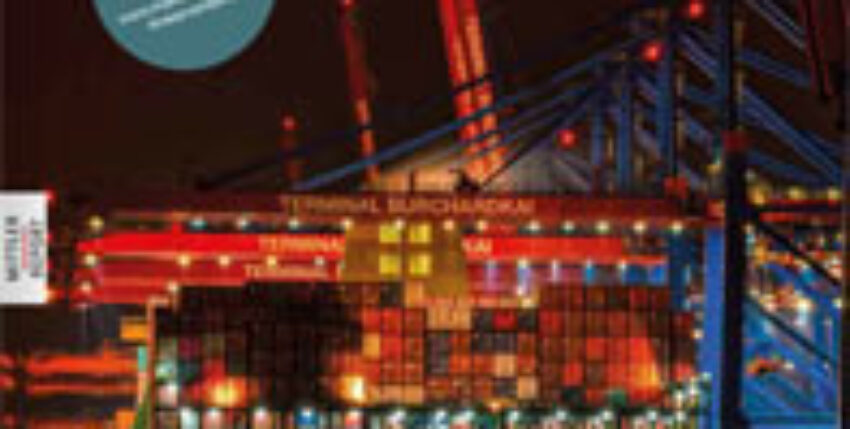Last week, the time had come: what is currently the world's largest container ship, the "Majestic Maersk", moored at JadeWeserPort for the first time together with the "Eugen Maersk", albeit unscheduled. Nevertheless, operators and politicians expect this to send out a signal that emphasises the JadeWeserPort's ability to handle the world's largest container ships, regardless of the tide. Opened around a year ago and designed to handle 2.7 million containers, the port's operations have been sluggish.
"Of course, the two ships are not the big breakthrough, because what we need are regular lines that moor at JWP and generate throughput", said Lower Saxony's Economics Minister Olaf Lies (SPD) in the daily newspaper Die Welt. "Lies reminded the audience that 20 Maersk ships of the Triple-E class, of which the 'Majestic Maersk' is the second, will soon be sailing. JadeWeserPort is the only deep-water port in Germany that can handle these ships fully loaded and independently of the tide."
As a result, all that remains of the visit are nice photos, as containers were not unloaded during the stop. JadeWeserPort is experiencing first-hand the need for German ports and the maritime industry in Germany to find a common port concept, because: None of the ports operate in a vacuum, but must see themselves in relation to the other German ports. How difficult the realisation of major infrastructural projects in Germany has become can be seen almost daily in regional and national news. In addition to prestigious megaprojects such as BER or Stuttgart 21, the local improvement or expansion of rail and motorway networks is faltering dramatically. The stagnating expansion of this infrastructure naturally plays an important role for maritime logistics, as the expansion of a port has an impact on land transport with increasing goods handling.
The World Wildlife Fund WWF already commented on this in May of this year that, in addition to the well-known ecological concerns, deepening the Elbe for the Port of Hamburg is not necessarily the best economic solution for Germany as a logistics centre.
Originally, the three federal states Hamburg, Bremen and Lower Saxony also designed for co-operation: The Jade-Weser-Port in Wilhelmshaven was to become their joint deep-water harbour. Instead of continuing to compete with each other, the partners wanted to strengthen each other in future. However, the dreams of co-operation are now history. In 2002, Hamburg applied for the Elbe to be deepened again in favour of its own port and withdrew from the joint project.
However, the expansion of the harbours has repeatedly encountered problems. Although the Jade-Weser Port went into operation last September. But because the huge plant is not utilised to capacitymost of the 400 employees have been on short-time working since March. At the same time, environmental organisations are fighting against the planned deepening of the Elbe and Weser rivers. Following their urgent application, the deepening of the Elbe was stopped by the courts for the time being last autumn.
Alexandra Endres: WWF predicts more profit for cooperating ports. Zeit Online, 14 May 2013.
It should be noted that the planned deepening of the Elbe was stopped by a lawsuit brought by the environmental organisations BUND and NABU, with the support of the WWF.
Against this backdrop, it makes more sense for the respective ports to specialise as part of a network than to fight on their own. Competition between ports must, of course, also be considered in a European context: A German port concept can only mean a step towards a European concept in the medium term.
If we use the Election programmes of the relevant parties CDU, SPD or GreensIf we are to believe the results of the 2013 BTW, there is at least nothing fundamentally standing in the way of a harbour concept. That's a good thing!
WWF Study 05/2013
Scenario for seaport cooperation in the area of container transport - an alternative to deepening the Elbe and Weser estuaries











One Response
The WWF will sort it out. They are in favour of the Jade-Weser Port and everything will be fine. But it is precisely the environmental organisations that have so far torpedoed economically sound concepts. >In Wilhelmshaven, they appear in a negative light at the latest when it comes to the expansion of the railway line or the motorway.
No, even a harbour concept is not the solution. The solution can and will only be found if politicians at federal and especially state level get down from their church towers and learn to tackle today's problems and their possible solutions in the long term (well beyond an election period). A former interior minister of Lower Saxony wanted to become the top pirate hunter without considering that piracy by definition only takes place in international waters. And counting frigates in the Fourth Entrance from the air makes no sense if you don't even enquire why so many frigates are moored at the pier (unscheduled departures due to actionism).
We therefore need a coordinated national and European concept for maritime trade and future transhipment centres.
One thing should also be clear: the world and Europe are not waiting for Germany here.